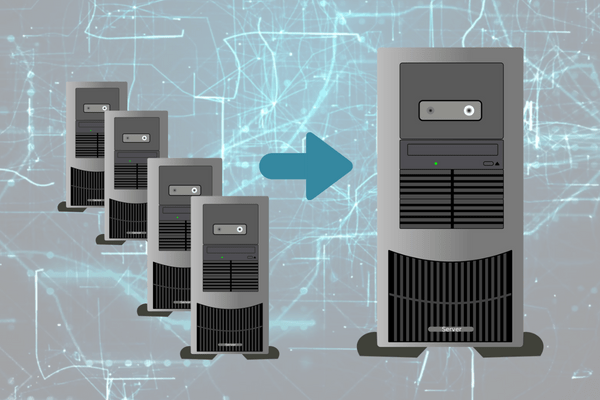Despite the fact that it sounds like a new age concept, virtualisation has actually been around since the earlier days of computing in the 1960s.
In order to reduce the need to expand the number of physical machines (desktop computers or servers), the idea was to find ways to maximise the capability of a single machine through clever allocation of its resources (storage, memory and processing).
This has evolved over the past 50 years to become one of the most exciting and useful developments in computing: virtualisation.
Virtualisation basically allows you to create multiple computers inside one computer, or multiple servers inside one server. The virtualisation software (VMware) allocates hardware resources where they are needed most, thereby maximising the use of a single machine.
But virtualisation has many more benefits than just cost and space saving on hardware.
Here are our 4 favourite advantages of virtualisation…
- Scale to meet business demand
Finding, purchasing, installing and maintaining a new server can be a time consuming and relatively costly exercise, and is rarely set up to match your exact business needs. I.e.: if you are managing 50 people in your workplace, your server probably has the capacity to handle 100 – meaning that you’re wasting space and not utilising all of your hardware effectively.
Virtualisation, on the other hand, makes it easier to scale by growing the system gradually as you increase resources. If you decrease resources, it will also scale down to match. This elimination of wastage provides a more efficient and affordable way to run your on-premise system.
It’s also faster and easier to test new applications, without making a significant investment in a physical test server.
- Recover from disaster
Because your software is not managed directly by your machine (it’s managed by the VMware), maintenance or repairs can be done without disruption to your business. This lack of downtime is essential for most businesses that rely on IT.
If your server fails, or you are hit with a virus, you should be able to continue working while it is being repaired. If your business data is critical to the success of your business, we would also recommend a DATO backup solution. In conjunction with virtualisation, it ensures that all of your data is being backed up regularly, and can be made available in the cloud so you can continue working if the worst were to happen.
- Mobility, productivity and collaboration
Today’s workforce is more mobile than ever, and should be supported by an IT infrastructure that allows for remote working while enhancing collaboration between teams.
Virtualisation allows remote logins to virtual desktops, where staff can access all of their files and the software they need to continue working – wherever they are. Used in conjunction with messaging apps and video conferencing, you can easily build a workforce that is empowered to work anytime, anywhere.
- Green IT
Most businesses are committed to being more conscious about their energy usage, and virtualisation is a definite step forward in achieving this.
By reducing the need for more physical hardware, you are also reducing the amount of heating, cooling and space that is required to run your computer’s IT system. And this can have further-reaching benefits than just the impact on your business bank account and the effectiveness of your IT.
Please keep in mind that virtualisation and cloud are not the same thing – even though they do complement each other very well. Having a virtualised server can make it easier to migrate certain IT operations to the cloud, which is something we can walk you through if you decide that a hybrid cloud environment is best suited to your business.
To chat with us about virtualising your desktops or servers, and maximising ROI for your IT hardware, give us a call on (02) 6189 1322 or contact us now.






